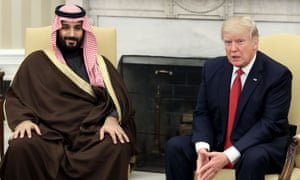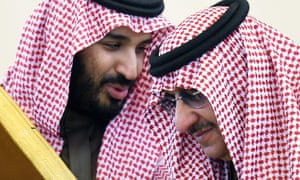
King Salman of Saudi Arabia has ousted his nephew as crown prince and replaced him with his son, Mohammed bin Salman, confirming the 31-year-old as heir to the kingdom and consolidating its move to reassert its influence as a regional power.
The move was announced by royal decree just after midnight, stunning the Saudi establishment, which has seen Bin Salman’s profile soar over the past three years but regarded the role of the former crown prince, Mohammed bin Nayef, a veteran security tsar, as secure.
The upheaval follows a dizzying series of moves from the usually cautious kingdom, which in
recent weeks has seen it recalibrate relations with Washington and open a diplomatic offensive against Qatar, led by Bin Salman’s office, while pressing ahead with a war in
Yemen and an ambitious economic and cultural overhaul at home.
Bin Salman has been central to the changes, which have helped his profile and powers grow rapidly under the tutelage of an 81-year-old monarch who has given him an almost free hand across most aspects of society.
 By contrast, Bin Nayef, a former interior minister and intelligence chief, and more traditional US ally, had been increasingly marginalised and the decree removed him from all his positions. He had played little role in the reform programme and was given little face time with Donald Trump during the US president’s visit to Riyadh in May, which is widely seen to have precipitated the change in succession.
By contrast, Bin Nayef, a former interior minister and intelligence chief, and more traditional US ally, had been increasingly marginalised and the decree removed him from all his positions. He had played little role in the reform programme and was given little face time with Donald Trump during the US president’s visit to Riyadh in May, which is widely seen to have precipitated the change in succession.
Bin Salman retains his role as defence minister and adds the position of deputy prime minister to his portfolio. He also chairs a weekly cabinet meeting that focuses on all aspects of Saudi society. The country’s allegiance council approved the changes by 31 out of 34 votes.
The new role formalises powers that Bin Salman had assumed with astonishing speed since his father ascended to the throne in January 2015. Since then, he has consolidated more influence than anyone else in the kingdom, spearheading plans for a privatisation of the state oil company, Aramco, while taking charge of the war in Yemen and one of the world’s largest arms budgets.
The decision to blockade and isolate Qatar, nominally a Saudi ally, was also led by Bin Salman’s office. The move, which continues to reverberate around the regional Gulf Cooperation Council, was sparked by the Trump visit that publicly reprioritised Riyadh as a regional ally and wound back the Obama administration’s warming relations with Iran.
Since then, Riyadh has tried to consolidate what it sees as its renewed prestige, and impose its presence in the region. Qatar had been viewed as an outlier because of its connections to Iran and the Muslim Brotherhood, both of which in Salman had seen as threats in Riyadh and elsewhere in the Gulf. In interviews, he has regularly ruled out dialogue with Iran, accusing it of “trying to control the Islamic world”.
The rapid rise of the prince has not been without criticism in Riyadh. “Lots of people don’t like him here,” said a western diplomat in the Saudi capital last month. “He is seen as precocious and beyond criticism. There is a view among parts of the establishment that he is not worthy of the powers that he has been given.”
Younger Saudis, however, are thought to be broadly behind an empowered prince who has regularly pledged to cater for their needs – by sharply increasing entertainment options across the conservative kingdom, while emphasising other touchstone issues such as education and more access to skilled jobs.
No comments:
Post a Comment